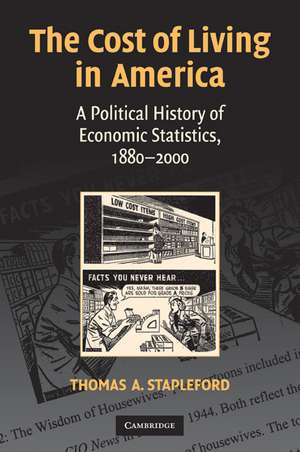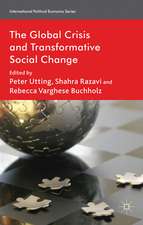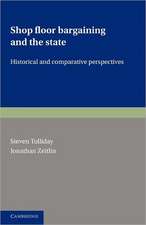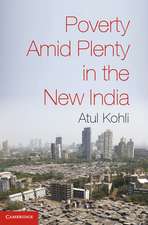The Cost of Living in America: A Political History of Economic Statistics, 1880–2000
Autor Thomas A. Stapleforden Limba Engleză Paperback – 30 aug 2009
| Toate formatele și edițiile | Preț | Express |
|---|---|---|
| Paperback (1) | 324.03 lei 6-8 săpt. | |
| Cambridge University Press – 30 aug 2009 | 324.03 lei 6-8 săpt. | |
| Hardback (1) | 561.51 lei 6-8 săpt. | |
| Cambridge University Press – 13 sep 2009 | 561.51 lei 6-8 săpt. |
Preț: 324.03 lei
Nou
Puncte Express: 486
Preț estimativ în valută:
62.00€ • 64.74$ • 51.32£
62.00€ • 64.74$ • 51.32£
Carte tipărită la comandă
Livrare economică 04-18 aprilie
Preluare comenzi: 021 569.72.76
Specificații
ISBN-13: 9780521719247
ISBN-10: 0521719240
Pagini: 440
Ilustrații: 7 b/w illus. 7 tables
Dimensiuni: 154 x 228 x 25 mm
Greutate: 0.57 kg
Editura: Cambridge University Press
Colecția Cambridge University Press
Locul publicării:New York, United States
ISBN-10: 0521719240
Pagini: 440
Ilustrații: 7 b/w illus. 7 tables
Dimensiuni: 154 x 228 x 25 mm
Greutate: 0.57 kg
Editura: Cambridge University Press
Colecția Cambridge University Press
Locul publicării:New York, United States
Cuprins
Introduction; Note on terminology and technical theory; Part I. Statistics and Labor Reform,1880–1930: 1. Before there were indexes: the 'labor question' and labor statistics, 1884–1910; 2. The cost-of-living statistics and industrial relations in the 1920s; Part II. Rationalizing the Democratic Political Order, 1930–1960: 4. The nature of a revolution: the Bureau of Labor Statistics from the bottom-up: union research on the cost of living; 7. Bounded conflict: collective bargaining and the consumer price index in the Cold War; Part III. The Consumer Price Index and the Federal Government, 1960–2000: 8. Accounting for growth: macroeconomics analysis and the transformation of price index theory; 9. From workers to the welfare state: the consumer price index and the rise of indexation; Epilogue: governance and economic statistics; Technical index: a brief primer on cost-of-living indexes.
Recenzii
'What could be more objective than collecting cost-of-living statistics? Stapleford masterfully shows that the process of determining what it cost to live in America was actually deeply political and contested over the course of the twentieth century. Who was doing the counting, with what measures, and to what ends made all the difference. More broadly, this is a fascinating and important case study of the political uses of social science research.' Lizabeth Cohen, author of A Consumers' Republic: The Politics of Mass Consumption in Postwar America
'This exceptionally fine book gives the all-important Consumer Price Index the nuanced, contextualized, probing, century-long history that it deserves. Starting with the first official price, wage, and family budget series, Stapleford details the tensions between theoretical and practical knowledge, between professional and bureaucratic standing, and between those asserting 'objective' as against normative purposes for measuring and comparing across income classes real changes in buying power and in the definition of 'living.' The measurement of poverty – or the failure to measure it fairly and seek its causes – is rightly a big part of this compelling narrative. This book is a vital addition to the growing literature of the making of policy knowledge.' Mary O. Furner, University of California, Santa Barbara
'Thomas Stapleford has done a magnificent job taking us inside the Bureau of Labor Statistics to demonstrate the political and ideological structures, in the government and out, that have so decisively framed the single most important index generated by the American state. Henceforth, no student of the economy, of labor, or of the welfare state can think intelligently about their subject without making use of this insightful and learned analysis.' Nelson Lichtenstein, University of California, Santa Barbara
'The Cost of Living in America is about an index number, which is to say, about the compression and homogenization of a plethora of diverse goods and activities into a single figure. Stapleford uses history brilliantly to disassemble that index into its historical constituents, demonstrating how economic measurement has reconfigured labor and business, war and poverty – indeed, the modern American state.' Ted Porter, University of California, Los Angeles
'… I am fully convinced by this book and would recommend it strongly … it is an extremely informative book with much index theory and politics. It is very fascinating and extremely useful for everybody who is interested in price indices, inflation measurement, social policy and the general political problems of official statistics or, as Stapleford's put it, in 'the deep and complicated entanglement of rationalized governance, cost-of-living statistics, and economic reforms' … One might also add 'and in the constitution of official statistics in a democracy'.' Peter von der Lippe, Journal of Economics and Statistics
'This exceptionally fine book gives the all-important Consumer Price Index the nuanced, contextualized, probing, century-long history that it deserves. Starting with the first official price, wage, and family budget series, Stapleford details the tensions between theoretical and practical knowledge, between professional and bureaucratic standing, and between those asserting 'objective' as against normative purposes for measuring and comparing across income classes real changes in buying power and in the definition of 'living.' The measurement of poverty – or the failure to measure it fairly and seek its causes – is rightly a big part of this compelling narrative. This book is a vital addition to the growing literature of the making of policy knowledge.' Mary O. Furner, University of California, Santa Barbara
'Thomas Stapleford has done a magnificent job taking us inside the Bureau of Labor Statistics to demonstrate the political and ideological structures, in the government and out, that have so decisively framed the single most important index generated by the American state. Henceforth, no student of the economy, of labor, or of the welfare state can think intelligently about their subject without making use of this insightful and learned analysis.' Nelson Lichtenstein, University of California, Santa Barbara
'The Cost of Living in America is about an index number, which is to say, about the compression and homogenization of a plethora of diverse goods and activities into a single figure. Stapleford uses history brilliantly to disassemble that index into its historical constituents, demonstrating how economic measurement has reconfigured labor and business, war and poverty – indeed, the modern American state.' Ted Porter, University of California, Los Angeles
'… I am fully convinced by this book and would recommend it strongly … it is an extremely informative book with much index theory and politics. It is very fascinating and extremely useful for everybody who is interested in price indices, inflation measurement, social policy and the general political problems of official statistics or, as Stapleford's put it, in 'the deep and complicated entanglement of rationalized governance, cost-of-living statistics, and economic reforms' … One might also add 'and in the constitution of official statistics in a democracy'.' Peter von der Lippe, Journal of Economics and Statistics
Notă biografică
Descriere
Stapleford interweaves economic theory with political history to show why Americans vest so much authority in the Consumer Price Index.


















